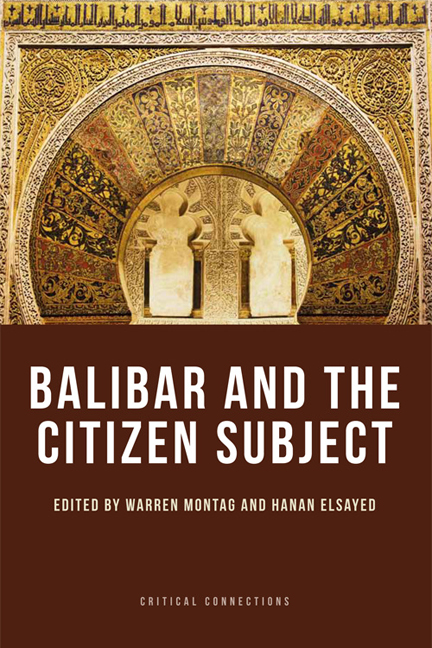Book contents
- Frontmatter
- Contents
- Introduction: Balibar and the Citizen Subject
- Part I Balibar Reading Schmitt Reading Hobbes: Equality or Similitude?
- 1 Schmitt's Hobbes, Hobbes's Schmitt
- 2 The Mortal God and his Faithful Subjects: Hobbes, Schmitt and the Antinomies of Secularism
- Part II Transindividual/Universal
- Part III Inequality, Violence and the Possibility of Citizenship
- Notes on Contributors
- Index
1 - Schmitt's Hobbes, Hobbes's Schmitt
from Part I - Balibar Reading Schmitt Reading Hobbes: Equality or Similitude?
Published online by Cambridge University Press: 10 January 2018
- Frontmatter
- Contents
- Introduction: Balibar and the Citizen Subject
- Part I Balibar Reading Schmitt Reading Hobbes: Equality or Similitude?
- 1 Schmitt's Hobbes, Hobbes's Schmitt
- 2 The Mortal God and his Faithful Subjects: Hobbes, Schmitt and the Antinomies of Secularism
- Part II Transindividual/Universal
- Part III Inequality, Violence and the Possibility of Citizenship
- Notes on Contributors
- Index
Summary
To read, to study Schmitt?
There is a rumor going around the academic microcosm that a new and rather unsavory alliance has been concluded between a segment of left (or ultra-left or Marxist) intellectuals, and certain currents of the far right, more or less openly nostalgic for the “new European Order” of the 1940s. The intermediary of this regrettable encounter: Carl Schmitt, the German legal scholar of sinister repute who, or whose work, has been elevated retrospectively to the rank of “great political philosophy.” And behind this body of work, the fascinating individual who presented himself before his judge at Nuremberg as an “intellectual adventurer,” a man who took the risk of thinking. It is this that has been called the Schmittian fashion, or the infatuation with Schmitt. The consequences? A neo-Romantic contestation of liberalism, rationalism and the principles of the rule of law: a sly rehabilitation of the totalitarian mode of thought, while the tragic experiences of the twentieth century are fading and the dark side of the liberal and democratic order is becoming apparent and finally (since it was impossible to begin there), a new outbreak of anti-Semitism in its intellectual forms (that prepared the way for its other forms or contributed in advance to their legitimation).
And the lessons of history sound the warning of the coming storm. Do they know what they are doing when they “intensively” translate Schmitt? When they comment on him, make their students read him, discuss his theses, seek in his philosophemes (decision, sovereignty, state of exception, friend–enemy distinction, the opposition between legality and legitimacy, and constituent power) the premises of a new elaboration of the political, do they do so with an intention opposed to his? Are they aware of the fact that Schmitt – even more than Heidegger (who prevailed on him to join the National Socialist Party (NSP)) and more effectively than he – was an enthusiastic adherent of the Nazi party and made himself an instrument of its legitimation in the legal sphere? Do they know that in his academic and administrative capacities he was a zealous advocate of purges?
- Type
- Chapter
- Information
- Balibar and the Citizen Subject , pp. 37 - 93Publisher: Edinburgh University PressPrint publication year: 2017



